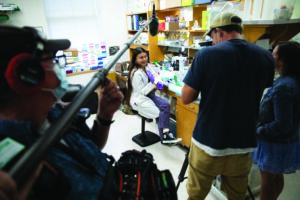National recognition for STEM pipeline program

The Aspirnaut STEM pipeline at Vanderbilt University Medical Center celebrated its 15th anniversary with a daylong scientific symposium, followed by a feature on the program broadcast Aug. 2 on “NBC Nightly News.”
The pipeline is designed primarily for under-resourced and under-represented rural high school and undergraduate students.
Dressed in white lab coats, 20 participants in this summer’s high school program delivered formal oral presentations of research ranging from the potential of a mitochondrial enzyme to limit the spread of cancer to the use of photoactivatable probes to study the COVID-19 virus in the body.
Sixteen were rising juniors and seniors at high schools from as far away as Deer Island, Maine, and Hector, Arkansas. They also included recent high school graduates who have been admitted to Columbia University and Davidson College, and a rising sophomore at Stanford University.
That is par for the course for the Aspirnaut pipeline, co-founded in 2007 by Julie Hudson, MD, MA, her husband, Billy Hudson, PhD, his brother, Johnny Hudson, and his sister, Ann Kincl.
Funded largely through donations, 162 high school research interns from 25 states have participated as summer research interns to date. Of these, 63 have graduated from college, 21 are pursuing careers in STEM fields (science, technology, engineering, or math), 12 have earned master’s degrees, and 12 are working on their MD or PhD degrees — or both.
“We take them on a guided time-travel journey, about seven years into the future, and show them what’s possible,” said Billy Hudson, the Elliott V. Newman Professor of Medicine at VUMC and director of the Vanderbilt Center for Matrix Biology.
Training in and entering well-paying STEM careers can help bring economic stability. Aspirnaut is showing one way to achieve that goal.
“Aspirnaut provides students with the tools and empowerment to effect positive change in themselves, their families and communities for generations to come,” said Aspirnaut Executive Director Julie Hudson, Vice President for Medical Center Relations at VUMC.
The students work full time in a laboratory on a discovery science project for six weeks with the goal of generating original data. Over the past 14 summers, 45 high school students have been listed as co-authors on papers published by scientific journals, several of which have advanced the field of knowledge in kidney disease and diabetes.
They also are tutored in professional skills including scientific communication, developing long-term relationships with mentors, and wellness training, skills that will serve them well when they enter their STEM professions.
